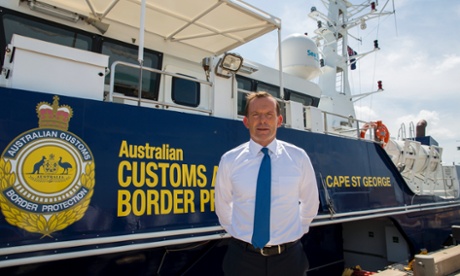Handing back asylum seekers is called refoulement. And it's illegal
In
his first column for Guardian Australia, our new legal editor at large
says the handover of Sri Lankans at sea has taken this country into new
legal territory
his first column for Guardian Australia, our new legal editor at large
says the handover of Sri Lankans at sea has taken this country into new
legal territory

stopping boats of asylum seekers landing on our golden soil is a higher
priority than protecting them according to international law.'
Photograph: Peter Eve/AAP Image
"Sometimes in difficult circumstances difficult things happen," Tony
Abbott told us in his stumbling way at the commonwealth heads of
government meeting (Chogm) in Sri Lanka in November last year.
He must have been inspired by Donald Rumsfeld's neat encapsulation of the post-invasion chaos in Iraq: "stuff happens".
Last
week "difficult things" were a distant memory as the prime minister
soothed us with the message that Sri Lanka "is at peace", even though it
is "not everyone's idea of the ideal society".
For the Abbott
government the importance of stopping boats of asylum seekers landing
on our golden soil is a higher priority than protecting them according
to international law.
The commander-in-chief of our
militarised refugee response, Scott Morrison, is on his way to Sri Lanka
this week to hand over two former Australian patrol boats to the navy
of President Mahinda Rajapaksa. No doubt the ceremonial glad-handing
will be accompanied by brass bands and fluttering flags. Sri Lanka is
the frontline of our no-boats policy and it must be extended every
courtesy, with care taken not to notice the torture and other abuses
routinely heaped on the Tamil population.
Australia knows the
situation on the ground in post civil-war Sri Lanka. It said so itself
in November 2012 when it called for the elimination of "all cases of
abductions and disappearances ... abuse, torture or mistreatment by
police and security forces". That was expressed as part of the UN's
regular human rights reviews.
In this context it's heartening
that the French have come to the rescue with a word that expresses what
in English requires a multiplicity of words – "refoulement".
Refoulement
is the forcing back of people to their place of origin where they are
expected to face persecution or threats to life and liberty on the basis
of race, religion, nationality, political opinion or membership of a
particular social group.
This is precisely what the Australian
border protection authorities are engaged in right now. Morrison has
confirmed today that 41 people – 37 Sinhalese and four Tamils – have
been transferred at sea to the Sri Lankan authorities. This took place
after a process of "enhanced" screening, which is an Orwellian word for
four rudimentary questions, all done without independent oversight.
The
circumstances of at least one other boat of 150 asylum seekers,
including an unknown number of Tamils, is unknown. It is now understood,
as a result of distress signals picked up by the New Zealanders, that
there is also a third boat intercepted by Australia.
Until we
know from the government details about those boats and their human
cargo, Fran Kelly's question to Senator Eric Abetz is entirely
justifiable: "Since when does our government disappear people?"
Australia
has non-refoulement obligations under both the refugee convention and
the convention against torture: "No State Party shall expel, return
[refouler] or extradite a person to another State where there are
substantial grounds for believing that he would be in danger of being
subjected to torture."
It doesn't get more straight forward than that.
Those
obligations also form part of our domestic law because that article
from the torture convention is incorporated into the Migration Act. The
legislation defines persecution as "serious harm ... systematic and
discriminatory conduct".
Serious harm amounts to:
▪ a threat to the person's life or liberty;
▪ significant physical harassment of the person;
▪ significant physical ill-treatment of the person;
▪ significant economic hardship that threatens the person's capacity to subsist; and
▪ denial of capacity to earn a livelihood of any kind, where the denial threatens the person’s capacity to subsist.
There
are no shortage of reports and studies that have identified those very
circumstances as ones faced by Tamils in Sri Lanka today.
The
Abbott government has taken us into a whole new territory as a result of
disregarding Australian human rights obligations under international
and domestic law. Conceivably, it opens the path to more high court
challenges and embarrassment globally as a human rights pariah.
From
the government the refrain is as predictable as it is tired. Morrison
has said that he will "not allow people smugglers to try and exploit and
manipulate Australia's support of these conventions as a tool to
undermine Australia's strong border protection regime that is stopping
the boats and the deaths at sea".
The flawed justification for
saving lives at sea is that it's acceptable to return people – who have
come into our care and to whom we owe obligations – to certain torture
or harassment.
It hardly seems a fair swap.

No comments:
Post a Comment